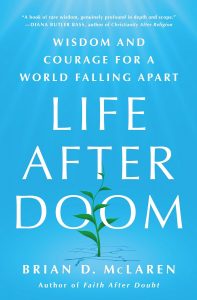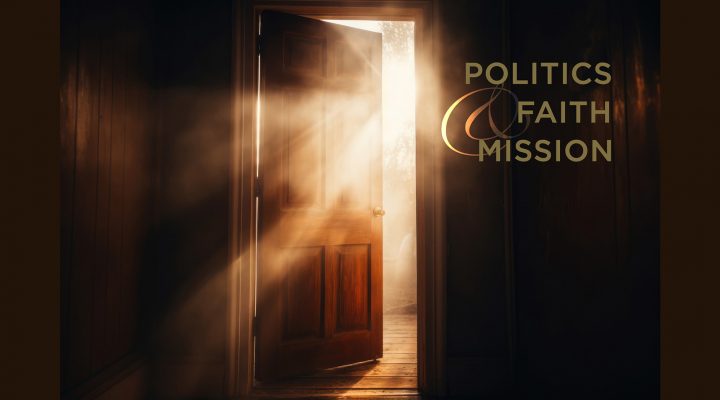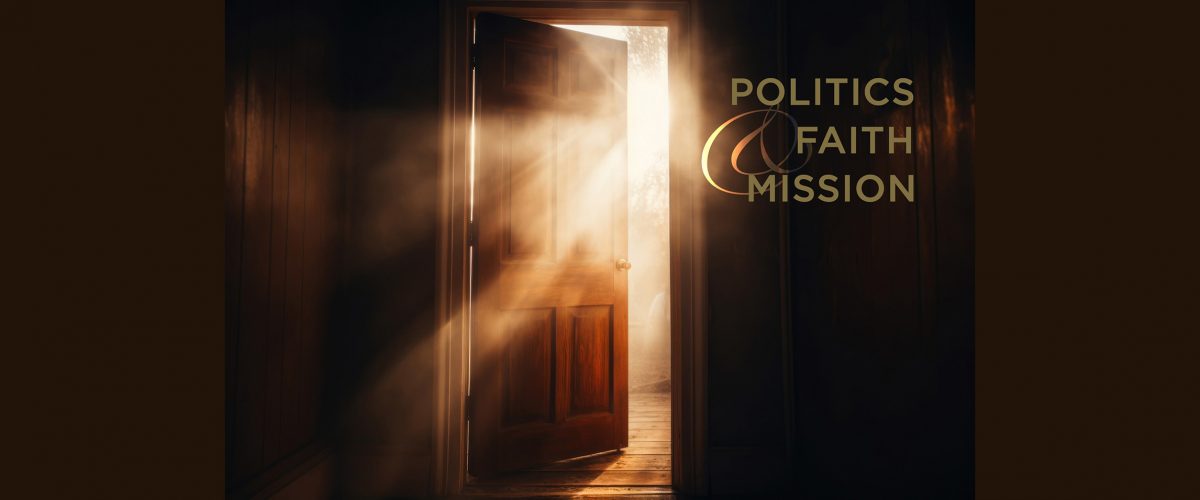Brian McLaren has been one of the most important voices in American Christianity for a quarter-century, and his new book, After Doom: Wisdom and Courage for a World Falling Apart, is a hard and beautiful and necessary book about how we face the myriad cataclysms barreling toward us. I’m grateful for him, for his work and for this conversation for Baptist News Global.
Greg Garrett: Brian, in Life After Doom, you are dealing with topics that bring so much anxiety that you are doing pastoral counseling within the book. Did your approach to writing this book differ from any of your previous writing? How does taking on the end of the world (!) shape the way you wanted to write this?
Brian McLaren: Greg, as I think you’ll understand, “once a pastor, always a pastor.” I spent 24 meaningful and rich years as a pastor in a local church, so I think that experience helped me see that what’s going on in millions of human bodies these days is not “normal.” And it’s not just rational, just a matter of taking in some information about climate change or economic inequality or political polarization and corruption.

Brian McLaren
What we face has an intellectual component for sure. There is no end to fascinating and sometimes overwhelming information to learn. It also has an emotional component. Our survival instincts are triggered, and our deepest belonging affiliations might be disrupted.
But we face, I think, most essentially a spiritual problem, touching what we value most deeply, the story we have been living by, the sense of accountability and promise we have in this life. So I hope my pastoral background will be felt be all readers, not just religious or Christian ones, as an asset.
GG: Early in the book you note how tempting it is to close your eyes to the facts and go back to sleep. I’m reminded of Dr. King’s last sermon, delivered at the National Cathedral, where he mentioned the story of Rip van Winkle and encouraged people not to sleep through a great revolution. Talk with us about the battle against “woke” and the reality that we need to be awake to the many dangers and threats facing us.
BM: Well, I’ve lived in Florida for the last 15 years and, lately, the most dangerous hurricane we’ve faced has come in the form of gusts of hot, humid, foul air from our politicians — first people like Rick Scott and Marco Rubio and lately, Ron Desantis. You may have heard that Desantis recently withdrew heat protections for workers, removed climate change from consideration in Florida lawmaking and continues to paint people who speak as I do in this book as “woke leftist environmental zealots.”
“They quote a lot of Bible in their efforts to maintain a status quo that they like and believe in very much.”
Our current politicians remind me of religious leaders in the 18th century like Southern Presbyterian Robert Dabney who defended slavery and mocked abolitionists. Like Dabney and his peers, they quote a lot of Bible in their efforts to maintain a status quo that they like and believe in very much. The best thing I can say for them is that they give people a clear choice in voting.
GG: One of my favorite parts of the book is about the prospect of grief for what we are losing or what we have lost. You go on to talk about how necessary — and how beautiful — grief is, even though many folks would like to avoid grief entirely. Can you speak to us about why you see grief as a powerful human experience we need to embrace? How could this help us this year?
BM: A pair of experiences among many others especially led me to write this book. First, I began to see how hope — which is a beautiful, essential, precious virtue — also can be used by others to manipulate us, to keep us from waking up and seeing how much trouble we’re in.
Second, I began to see grief — as you say, something most of us avoid — as a beautiful, essential and precious virtue like hope, rather than something to avoid. I include a haunting question about grief from the AI/synthezoid character Vision in the TV series WandaVision: “What is grief if not love persevering?”
“What is grief if not love persevering?”
I’ve come to see our lack of grief for many things being lost as a sign that we never loved them as we should, and I’m coming to see the waves of deep grief that are coming over many of us as signs of deep love — for a forest that got bulldozed, for our heating and rising oceans, for our beloved earth as a whole, for our democracy that seems to be so much under threat.
GG: In the book, you talk about faith understandings, particularly faith understandings that don’t hold up, stories that break apart. Over the years we have been in conversation, you’ve led the way in helping folk understand how they might find a usable faith even if it isn’t the one handed down to them. How should we read the Bible in 2024? How should we look for Jesus, and what will we find if we find him?
BM: I’ve been (half) jokingly saying lately we should modify our liturgies before and after Scripture reading. Before, we should say, “We are about to read a precious and dangerous gift from our ancestors. It is precious because it addresses life’s most profound questions and challenges us to think and rethink. It is dangerous because we Christians have so often misunderstood it and abused it, to the harm of other people and the Earth itself.” Then, after, we should say, “Thanks be to God for the Scriptures, and for the Holy Spirit to help us understand them with appropriate humility and wisdom.”
We might even introduce the Gospel reading with something like this: “A reading from the Gospels which testify to the indigenous prophet and counter-imperial activist Jesus, and to his good news of an alternative civilization.” As you know, the book includes an overview of the whole Bible as a library of ecological wisdom, and it invites us to consider Jesus as an indigenous Jewish-Palestinian prophet. We might believe him to be more than that, but we should never understand him to be less than that.
 GG: Two English majors in conversation. One of my primary hopes in this interview series centers on hope. Whether we’re talking Baldwin or Mary Oliver or Wendell Berry, I am wondering what you’re reading, hearing and doing that is bringing you joy and comfort in 2024. Teach me something!
GG: Two English majors in conversation. One of my primary hopes in this interview series centers on hope. Whether we’re talking Baldwin or Mary Oliver or Wendell Berry, I am wondering what you’re reading, hearing and doing that is bringing you joy and comfort in 2024. Teach me something!
BM: My favorite book that I encountered in my research was All We Can Save. Scientist Ayana Elizabeth Johnson and writer Katharine K. Wilson edited this collection. I didn’t read the cover matter before I dove into the book, and when I finished, I thought to myself, “There’s something different about this book, its value system, its spirit. It is very special.” And then I realized all the contributors and editors were women.
Obviously, to the degree women have been excluded from the centers of power in our current extractive economy, it makes sense that they would have a vantage point especially needed because they have been less brainwashed by the system.
Similarly, as our civilization rushes past sustainability, we also need indigenous voices, those whose histories and cultures always have made them suspicious of the world-dominating project of our civilization. As you know, I propose in Life After Doom that the Bible is written from the standpoint of indigenous Palestinian Jews.
Recently, I came upon a book by an Australian philosopher, Freya Matthews, called The Dao of Civilization: A Letter to China. She proposes that Lao Tsu and the Tao Te Ching occupy a similar place in Chinese civilization, a repository of pre-imperial indigenous wisdom.
Three other books that helped me understand this vital indigenous lineage were Jonathan Lear’s biography of Crow Chief Plenty Coups, Radical Hope, along with Choctaw elder/Episcopal bishop Steven Charleston’s We Survived the End of the World, and Cherokee Randy Woodley and Shoshone Edith Woodley’s upcoming Journey to Eloheh.
Greg Garrett teaches creative writing, film, literature and theology classes at Baylor University. He is the author of two dozen books of fiction, nonfiction, memoir and translation, including the critically acclaimed novels Free Bird, Cycling, Shame and The Prodigal. His latest novel is Bastille Day. He is one of America’s leading voices on religion and culture. Two of his recent nonfiction books are In Conversation: Rowan Williams and Greg Garrett and A Long, Long Way: Hollywood’s Unfinished Journey from Racism to Reconciliation. He is a seminary-trained lay preacher in the Episcopal Church. He lives in Austin with his wife, Jeanie, and their two daughters.
More from this series:
Politics, faith and mission: A conversation with Samuel Perry
Politics, faith and mission: A conversation with Jimi Calhoun
Politics, faith and mission: A conversation with David Dark
Politics, faith and mission: A conversation with Randolph Hollerith
Politics, faith and mission: A conversation with Jillian Mason Shannon
Politics, faith and mission: A conversation with Bishop Mariann Edgar Budde
Politics, faith and mission: A conversation with Vann Newkirk II
Politics, faith and mission: A conversation with Sarah McCammon
Politics, faith and mission: A conversation with Winnie Varghese
Politics, faith and mission: A conversation with Kaitlyn Schiess
Politics, faith and mission: A conversation with Russell Moore
Politics, faith and mission: A BNG interview series on the 2024 election and the Church
Politics, faith and mission: A talk with Tim Alberta on his book and faith journey
Politics, faith and mission: A conversation with Jemar Tisby
Politics, faith and mission: A conversation with Leonard Hamlin Sr.
Politics, faith and mission: A conversation with Ty Seidule
Politics, faith and mission: A conversation with Jessica Wai-Fong Wong


